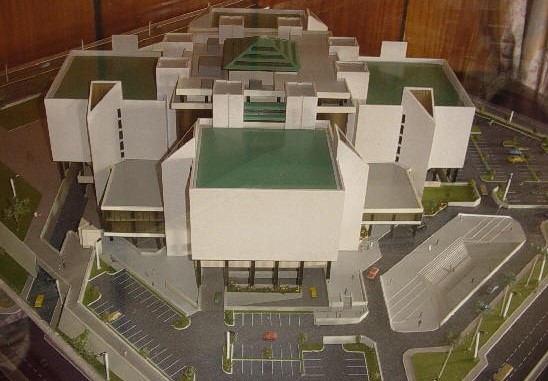National Repository of Nigeria
The Apex Repository of the Federal Republic of Nigeria with objectives to:
- Preserve in electronic format the intellectual and cultural resources of Nigeria for posterity.
- Increase the visibility of the Nigerian knowledge storehouse and its scholarly, literary and cultural heritage; and
- Increase the availability and accessibility of Nigerian content to the global community.

Our Categories
Select a Category to browse its collections.
- Speeches/Essays of past and present Presidents, Political office holders of the Federal Republic of Nigeria and other well meaning Nigerians
- These are a collection of sound recordings, such as lectures, interviews, podcasts, music, and oral histories. These audio materials cover a wide range of topics and are available for listening, learning, and research purposes."
- Collection containing extensive selection of framed autographs, manuscripts, historical books and materials from pre-colonial times
- A collection of the constitutions, Laws and Acts of the Federal Government of Nigeria, all Political parties and parastatals
- Historical information of Nigerians based on personal narration
- A collection of all official government gazettes and circulars by the Federal Government of Nigeria and its federating states.
- These are a collection of materials that support the preservation, promotion, and revitalization of indigenous languages. These resources include language learning materials, dictionaries, stories and cultural documents that reflect the linguistic and cultural diversity of indigenous communities."
- A collection of writings on different subjects published in journals and other periodicals
- A collection of Maps of different locations in Nigeria
Recent Submissions
Contemporary legal cooperation: China and Africa: A Comparative survey of legal systems
(Lagos state: Feni ‘O’ Venture Ltd, 2023) AZU John C.
• Introduction to law, democracy, and legal system.
• Definition of law.
• Theories of law and court.
• Universal concept of rule of law.
• Classification of legalism.
• Two prospects of China-Africa legal cooperation.
• Areas of China-Africa cooperation and legal mechanism.
• FOCAC and China-Africa legal cooperation.
• BRI and China legal cooperation.
• Common legal risks, issues in China-Africa cooperation.
• Land.
• Finance.
• Expatriate quota and resident permit.
• Local content.
• Indigenous raw materials.
• Copyright infringement.
• ADR and China-Africa legal cooperation.
• Technology and China-Africa legal cooperation.
• A review of Chinese legal system.
• Confucianism, Legalism, Buddhism and Taoism.
• Marxism-Leninism ideology.
• European continental, civil, and common law.
• The Structure and Procedure of the Chinese Judiciary.
• The administrative divisions of China.
• The structure and hierarchy of Chinese courts.
• The procedure of the Chinese law.
• Filing procedure.
• Interim measures.
• Judgements and enforcement.
• Appeals
• The collegial system.
• People's assessor.
• Judicial committees.
• The protectorates.
• Foreign proceedings and judgements
• ADR in China.
• Continuing construction of the Chinese legal system
• Notes on African legal systems.
• Background to African law.
• English common law system.
• Ghana.
• Nigeria.
• Kenya.
• French Africa civil law system.
• Benin
• Senegal.
• Tunisia.
• Comparison of China-Africa laws and procedure.
• Relativity of the concept of rule of law.
• Nuances of fundamental human rights.
• adversarial versus inquisitorial trial mode.
The Original woman unveiling the pride of womanhood
(Nigeria: Royal Publishing,, 2023) OLOWOJOBA, Glory
■ The Woman
God’s Purpose
■ The Woman Is A Companion
■ The Woman Is An Helpmeet
■ The Woman’s Psyche
■ Understanding The Nature of Man
■ Balancing The Scale
■ The Mystery of Womanhood
■ God’s Order
■ Fragile Not Weak
■ The Wise Woman
■ Quotes About Women
The First-Class Mindset…Mindset Over Result
(Nigeria: Royal Dynamo Designs, 2025) BAMIGBOSE, Deborah
■ From Know To Know-How
■ Understand Yourself
■ Where Are You Headed?
■ Truly, Iron Sharpens Iron
■ Build Yourself While You Learn
■ Personal Finance
■ Serve God And Men
■ Your Academic Game Plan
The Scarlet Cord Never Forget Again: Say Goodbye to Broken Promises
(Kano State(4 Shaba street Hadejia road): Kingswit Bloc Publishers, 2024) ILORI, Bimbo
■ Promise
■ Why do promises break
■ Steps To Keeping Promises-1
■ Steps To Keeping Promises - 2 (Scarlet Cord)
The Test Of Triumph Thriving in Systems Without Trifling with Your Values
(Kano State(4 Shaba street Hadejia road): Kingswit Bloc Publishers, 2025) ILORI, Bimbo
■ The Terrain of Triumph: Understanding the context where tests arise
■ Staying Rooted in Babylon: Thriving where the culture challenges your values
■ Sustaining Inner Integrity: How to pass the test with your soul intact
■ Legacy Beyond the System: Living and leading with eternal relevance